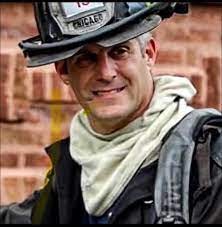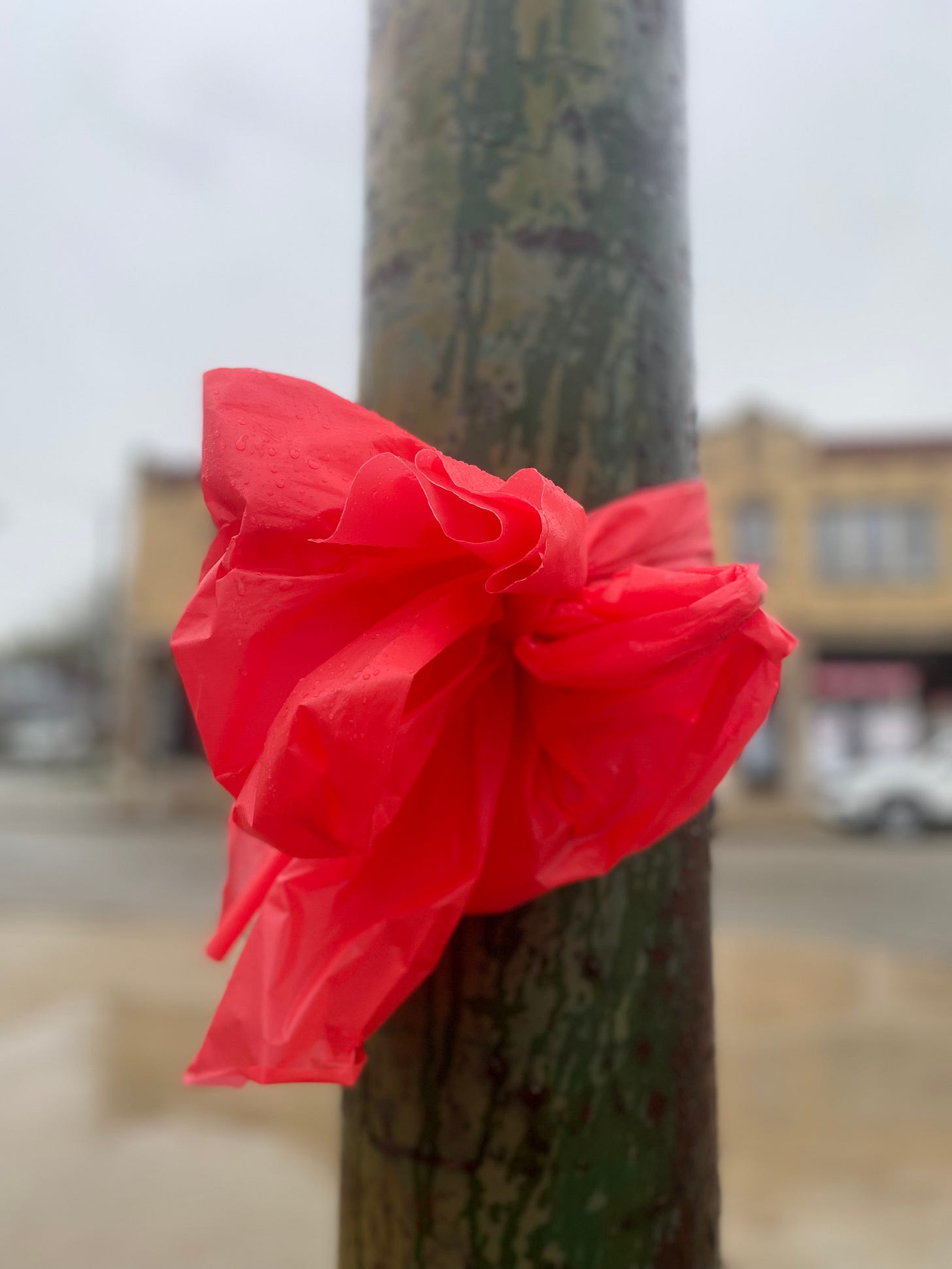Today is National Fallen Firefighter Day. When these remembrances cross our timelines or interrupt our day, most of us mark them as noble gestures—acknowledging the bravery of those who run toward danger while the rest of us run away. We might pause, hit "like," perhaps share a post. In our cultural imagination, firefighters exist as larger-than-life heroes—strong, stoic, selfless figures who emerge from smoke and flames.
In our neighborhood on the northwest side of Chicago, red ribbons still hang along Milwaukee Avenue from Portage Park to Niles—part of the route for Chicago Fire Department's Captain David Meyer's funeral procession on April 29th.
We tied some ribbons on the Raven Street side of Onahan Elementary where we went to school together. After tying the ribbons to street poles and walking in the footsteps of our younger selves, I drove past the bungalow-lined street where he grew up, where his parents still live. Black and red ribbons from the fire department line that block, a family street now marked by profound loss.
When I explain to neighbors who might not be familiar with the tragic story and wonder what the ribbons mean an immediate grief and understanding of the loss washes over them as the shake their heads in sorrow.
These are the moments that define neighborhoods like ours—when larger-than-life heroes emerge from familiar streets. When a community mourns together: his parents who raised him here, his wife and children who anchored his world, his fellow firefighters who now carry on his mission, and the city he protected. When personal loss becomes collective grief.
Growing up in Norwood Park, we shared a community where service runs deeper than bloodlines. Our streets were—and still are—home to generations of Chicago firefighters, police officers, and paramedics. The calling moves through families like inherited memory, and local legends are made of those who answer when their neighbors need help. David Meyer was one of our own, a neighborhood boy who would grow up to embody so much of what Norwood Park stands for.
In the golden light of our childhood summers, David Meyer was the boy with the lightning-quick feet, racing through neighborhood streets with a curious mind and a generous spirit. I can still see him in those twilight hours, our faces illuminated by the gentle glow of lightning bugs floating over the sidewalk in the dusk. When we were young, our biggest concerns were making it home before the streetlights came on and deciding which adventure to embark on next. Those carefree days of the 1980s—filled with laughter, games, and the endless possibilities that stretched before us—gave just the first glimpses of the man David would become.
Dave was truly one of the good ones—the kind of kid you remember decades later for all the right reasons. His sense of humor was evident even then, quick with a joke that would ease tension or bring a smile. There was a low-key confidence about him that made everyone around him feel safe. He wasn't loud or boisterous about it; he just had this way of being present that said, "Everything's going to be okay." Perhaps that quality, so evident in childhood, was what would later draw him to a life of service.
As one of the few Mexican kids in our neighborhood, I often struggled to feel like I belonged. But Dave was different. In a place where bullying was common and kids could be cruel about differences, Dave made a point of making people feel included and accepted. He saw people, not categories. Maybe that's why his kindness has stayed with me all these years—because in those moments when others made me feel small, Dave made me feel seen and valued.
Later, we both attended Lane Tech High School, though in a school of over 5,000 students where he was a year ahead of me, childhood friendships naturally evolved. The small neighborhood connections that had brought us together gave way to different social circles, but the foundation of who he was—the kindness and humor that made him special—remained constant.
The kind boy who ran through our neighborhood grew into a man who would dedicate his life to protecting others. Captain David Meyer, a 28-year veteran of the Chicago Fire Department, passed away on April 23, 2025, after sustaining injuries while fighting a fire in the Austin neighborhood of Chicago. He was 54 years old.
David spent nearly three decades serving the people of Chicago, working primarily on the West Side in some of the city's busiest firehouses. He joined the Chicago Fire Department in 1996 and steadily rose through the ranks, serving as a lieutenant on Truck 35 before being promoted to captain of Truck 29.
His colleagues remember him as a respected leader and a steady presence—someone who loved what he did and excelled at it. As one fellow firefighter said at his service, "Dave loved being a firefighter. And not just a firefighter. A Chicago Firefighter." That distinction captured the essence of who he was—a man rooted in the particular character and challenges of our city.
At his funeral, another firefighter shared one of Dave's favorite sayings: "Don't be an asshole today." It was quintessential Dave—straightforward, practical wisdom delivered with that same disarming humor he'd had since childhood.
What became abundantly clear during the funeral service was Dave's legendary status as a prankster within the fire department. His firefighter brothers and sisters shared story after story of his elaborate pranks and good-natured teasing—always done with such genuine warmth that you knew it came from a place of affection. One story even involved a neighbor who eventually had to establish boundaries about how far the pranks could go! Through these stories, a picture emerged of a man who brought laughter and light to an incredibly demanding profession, who knew exactly when levity was needed most.
The priest who opened the service noted that Dave would have hated all the attention and ceremony—a testament to his humble character and focus on service rather than recognition.
But long before he put on the uniform, David was a neighborhood kid with a bright smile. Those of us who knew him in grade school remember his kindness—how he would include everyone in games, how he never had a harsh word for anyone. Even then, there was something about David that suggested he would grow up to make a difference.
The boy who once raced through our streets with abandon grew into a man who would run toward danger when others fled from it. The same adventurous spirit that led him through childhood explorations guided him to a life of service where each day brought new challenges and the opportunity to help others.
David leaves behind his wife—his high school sweetheart with whom he had been together since their days at Lane—three daughters, a son, and his parents. His family was the cornerstone of his life; his wife described him as "the rock" of their family.
At the funeral, his children shared incredible stories that revealed the depth of his love through countless thoughtful gestures. He would show up at track events even during his shift, with his crew's help. At ice skating performances, he'd pace behind a pillar so his daughter wouldn't spot him and get nervous. His sense of humor showed even in family decisions—he'd wanted to name his son Harley because he loved riding motorcycles, and their son would be "HARLEY DAVIDSON." It was the storytelling that painted a picture of a man who didn't just talk about love but demonstrated it daily through his actions and presence. Friends and colleagues mentioned how proud he was of his granddaughter and how much he loved her. For all his dedication to his profession, it was clear that his greatest pride was in his family.
In childhood, we rarely consider the paths our playmates will take or the lives they will touch. We couldn't have known that the boy racing alongside us would one day be called Captain, that he would dedicate his life to saving others, or that he would leave behind a legacy of service that would make an entire city mourn.
As we remember David Meyer—both the carefree child chasing lightning bugs in the summer twilight and the dedicated firefighter—we are reminded that the qualities we see in youth often foretell the adults we become. The kindness and quiet strength he showed as a child blossomed into a lifetime of service. The humor that made him beloved on the playground became the wisdom that guided his firefighter family. The calm presence that made friends feel safe became the leadership that his colleagues relied upon in moments of crisis.
To David's family, colleagues, and all who loved him: your loss is immeasurable, and words cannot adequately express the depth of gratitude our city owes to him and to you. The boy who once raced through our neighborhood has completed his final call, but the impact of his life and service will continue to resonate through the lives he touched and the community he served so faithfully.
Rest in peace, Captain David Meyer. Your kindness, your humor, and your quiet strength live on in all who knew you.
In the tapestry of Chicago stories, David Meyer's light continues to shine. From lightning bugs to emergency lights, from playground games to life-saving rescues, his journey is Norwood Park's story—and Chicago's story. One of growing up together and rising to serve together.





